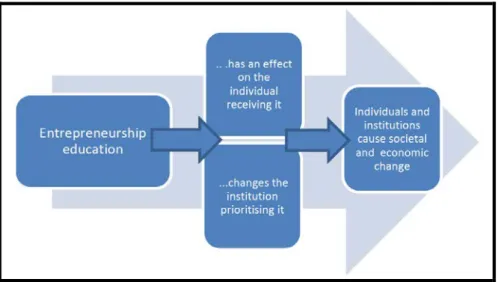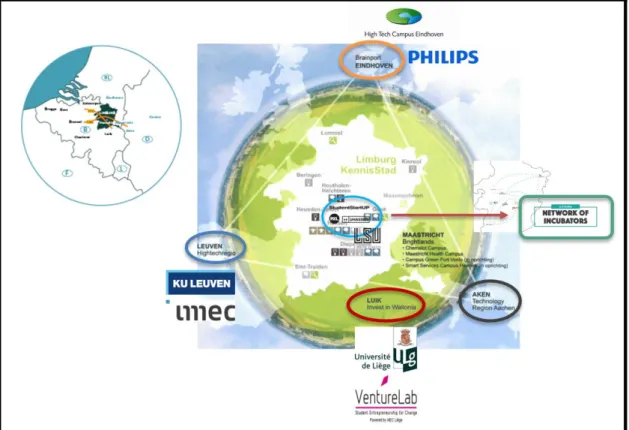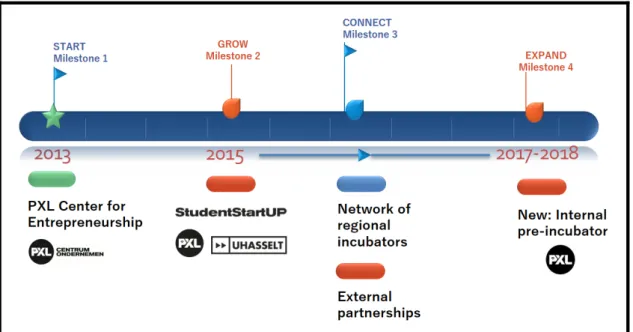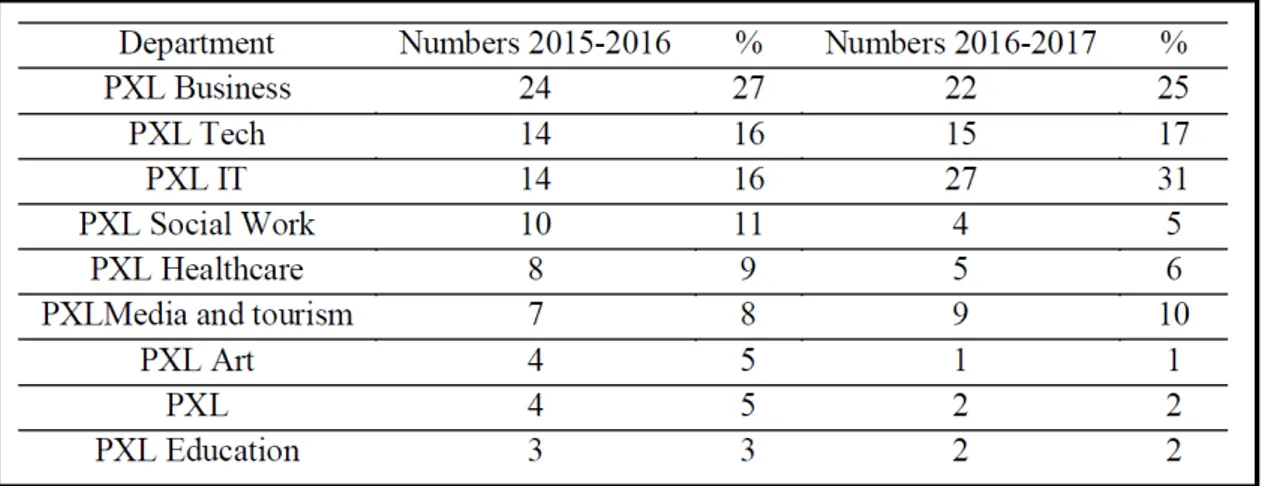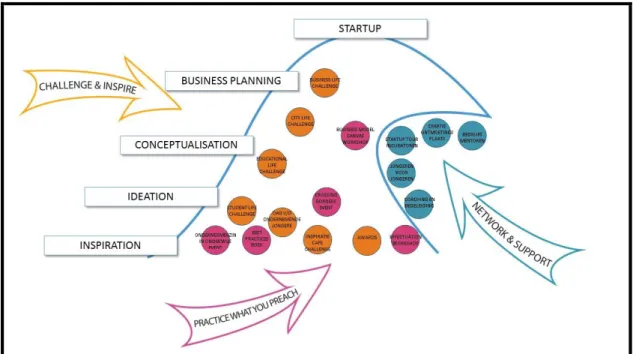StudentStartUP - Building Entrepreneurship
Programs and Centers in the Limburg
region (Belgium)
dr. Jean-Pierre Segers 1 1 PXL University College, PXL-BusinessFounder/Chairman of StudentStartUP
Abstract
This contribution describes the strategic orientation of two HEIs (higher education insti-tutions) in becoming fully engaged in entrepreneurship education within the emerging entrepreneurship ecosystem in the Limburg region (Belgium). Education and research are aligned with the development of the region and of the regional entrepreneurship eco-system.
Entrepreneurial ecosystems have emerged as one of the most dynamic forces shaping the economic performance of individuals, companies and regions. They have become impor-tant for (academic) research, regional policy objectives as well as regional economic per-formance. This approach is related to the entrepreneurial university concept and its role in stimulating economic growth but also sustainability and adapted business models through cooperative relationships between higher education, business and government. Entrepreneurial HEIs (higher education institutions) can act as ‘anchor institutions’, em-bedded within and committed to a region and to regional development. The entrepreneu-rial university as a regional anchor institution therefore has an important presence in the local community and makes a strategic contribution to the local economy. These activities go beyond the business school, extend across the institution and embrace the wider net-work. This involves alternative forms of entrepreneurship education via pedagogical in-novations and practice-based learning outside the classroom.
Regional entrepreneurship ecosystems are emerging with highly motivated student/aca-demic entrepreneurs who are not just becoming future employees but alternatively are setting up their own business during their study program or after graduation. The HEI’s can provide this support directly themselves or refer potential entrepreneurs to specialized start-up support services within the regional entrepreneurship ecosystem.
The proposed strategic model is that of a networked incubator. This is a type of business incubator model, which is well suited to grow businesses. It has some features in common with other incubators such as fostering and promoting a spirit of entrepreneurship and offers economies of scale. A networked incubator can provide tremendous value to a start-up team through connections that help forge crucial strategic partnerships, recruit highly
talented people, forging of marketing and technology relationships between them and ob-tain important advice from outside experts. Networked incubators provide value through preferential network access, preferential access to potential partners and advisers. With the help of such an incubator, start-ups can network to obtain resources and forge part-nerships with others quickly, allowing them to establish themselves in the marketplace ahead of competitors.
The case of the Limburg region in Belgium is a good illustration of the networked incuba-tor model. The Limburg Region is located in Flanders (Belgium) in the heart of the so-called ELAt knowledge triangle: Eindhoven - Aachen - Leuven - Liège. The region is currently migrating into an innovation driven economy with a greater potential for inno-vative entrepreneurial activity. An important feature of the emerging entrepreneurial eco-system in the Limburg region is StudentStartUP, a joint venture of PXL University Col-lege (university of applied sciences) and Hasselt University. The PXL Center for Entre-preneurship - the later StudentStartUP - was set up in 2013 motivated by the belief that (under)graduates are not just becoming future employees but alternatively are setting up their own business as highly motivated student/academic entrepreneurs.
Keywords
Entrepreneurship Education, Student-Entrepreneurship, Entrepreneurship Centers, Networked Incubators, Regional Entrepreneurship Ecosystem.
1
Introduction
This contribution describes the strategic orientation of two HEIs (higher education insti-tutions) in becoming fully engaged in entrepreneurship education within the emerging entrepreneurship ecosystem in the Limburg region (Belgium). Education and research are aligned with the development of the region and of the regional entrepreneurship eco-system. A regional strategic partnership alliance accelerates entrepreneurship driven edu-cation and research.
For this purpose a mix of entrepreneurship education programs, seminars and dedicated events were introduced for all faculties and departments together with the partnership network. The PXL Center for Entrepreneurship - the later StudentStartUP - was set up in 2013.
This paper is structured as follows: after a short review of the literature, the emerging entrepreneurship ecosystem in the Limburg region is outlined. The StudentStartUP ent-repreneurship center and other programs are then highlighted followed by a discussion of the findings and intermediate results..
2
Literature review
Entrepreneurial ecosystems have emerged as one of the most dynamic forces shaping the economic performance of individuals, companies and regions (Audretsch, 2017). They have become important for (academic) research, regional policy objectives as well as re-gional economic performance. This approach is related to the entrepreneurial university concept (Gibb, 2014) and its role in stimulating economic growth but also sustainability and adapted business models through cooperative triple helix relationships between higher education, business and government.
Entrepreneurial HEIs (higher education institutions) can act as ‘anchor institutions’, em-bedded within and committed to a region and to regional development. The entrepreneurial university as a regional anchor institution therefore has an important presence in the local community and makes a strategic contribution to the local economy (Culkin, 2016). These activities go beyond the business school, extend across the institution and embrace the wider network. This involves alternative forms of entrepreneurship education via pedago-gical innovations and practice-based learning outside the classroom.
A widely accepted strategic model is that of the ‘networked incubator’ (Hansen et al., 2000; Roseira et al., 2014). This is a type of business incubator model, which is well suited to grow businesses. It has some features in common with other incubators such as fostering and promoting a spirit of entrepreneurship and offers economies of scale. A networked incubator can provide tremendous value to a start-up team through connections that help forge crucial strategic partnerships, recruit highly talented people with the 21st century skills, forging of marketing and technology relationships between them and obtain impor-tant advice from outside experts. Networked incubators provide value through preferential network access, preferential access to potential partners and advisers. With the help of such an incubator, start-ups can network to obtain resources and forge partnerships with others quickly, allowing them to establish themselves in the marketplace ahead of compe-titors.
According to a country study for Belgium (Segers, 1989), the entrepreneurial spirit of educational institutions can enhance student start-up intentions. Highly motivated student and/or academic entrepreneurs are not just becoming future employees but alternatively are setting up their own business during their study program or after graduation. The stu-dents participating in entrepreneurship education are more likely to start their own busi-ness and their companies tend to be more innovative and more successful than those led by persons without entrepreneurship education backgrounds (European Union, 2015). According to the latter European Union benchmark study (2015), participation in the entrepreneurship education programs connected to the Action Plan in Flanders (Belgium) led to students having higher entrepreneurial intentions. While half of the students found having their own company a compelling thought, 33% of students thought they would indeed realise that wish. This is an important finding as students’ company founding intentions seem to go together with creativity, innovation and other indicators related to
risk-propensity. A study from Wallonia (Belgium) on the ‘Entrepreneurship Spirit Program’ run by the Walloon Agency for Economic Stimulation showed that teachers and heads of schools at all levels of education who received specific training changed their attitudes and raised their interest in entrepreneurship. Evidence from cases in Wal-lonia (Belgium) and other regions in the European Union indicates that raising the awa-reness of teachers of entrepreneurship increases the likelihood that they will engage in entrepreneurship, use relevant tools and actions and be more motivated to set-up entre-preneurial activities. Moreover, they seem to be better able to support their students’ entrepreneurial learning processes.
This process of change is illustrated by Fig. 1.
Fig. 1: Simple theory of change triggered by entrepreneurship education (European Union, 2015)
3
Limburg region
The case of the Limburg region in Belgium is a good illustration of the networked incu-bator model. The Limburg Region is located in Flanders (Belgium) – see Fig. 2. – in the heart of the so-called ELAt knowledge triangle: Eindhoven (Brainport, Netherlands); Aachen (Germany); Leuven (IMEC, Belgium) and Liège (Belgium).
Fig. 2: the Limburg region (Belgium) within the ELAt triangle
Automotive production and consumer electronics R&D and production were the heart of the Limburg regional economy. However, during the last decades, the Limburg region was struck by a massive shutdown of its large international anchor companies:
› 2003-2004: PHILIPS production plant and R&D facilities (minus 3000 employees + subcontractors);
› 2013-2014: FORD Motor Company production plant (minus 15.000 employees + subcontractors).
The region is currently migrating into an innovation driven economy with a greater po-tential for innovative entrepreneurial activity. A strategic action plan was put into place – the so-called ‘SALK’-plan – to enhance the economic renewal and revitalization of the region. One of the key goals is to strengthen and intensify the number of new startups and scale ups in the emerging regional entrepreneurial ecosystem.
To reinvigorate the local economy, a number of high technology incubators were set up by the regional investment company LRM. Their location, right in the middle of the “ELAt” triangle of technology hubs Eindhoven, Leuven and Aachen and with the Liège ecosystem nearby, provides an opportunity to partner with existing clusters and thus ex-pand the horizon internationally (Tech.eu, 2015). Moreover, LRM has multiple initia-tives running simultaneously in the Limburg region including healthcare and medtech,
cleantech, green- and energytech, drone technology, blockchain, virtual reality and inter-net of things. About one hundred startups and scaleups are now working on the former PHILIPS R&D-site, while the former FORD production site is migrating towards its re-naissance in the industries of the future (industry 4.0; lead factories; 3D-printing). This new and rapidly developing regional entrepreneurial ecosystem made a clear choice for open innovation and is triggering new and sustainable business models. Currently, the top-5 technologies are hardware, software, data analytics, internet of things and 3D-print-ing. 42% of the new firms in the Limburg region are startups; 41% are scaleups.
4
StudentStartUP
An important feature of the emerging entrepreneurial ecosystem in the Limburg region (Segers, 2016) is StudentStartUP (Segers, 2015; Bantani, 2017; Franco et al., 2018), a joint venture of PXL University College (university of applied sciences) and Hasselt Uni-versity. The PXL Center for Entrepreneurship - the later StudentStartUP - was launched in 2013 motivated by the belief that graduates are not just becoming future employees but alternatively are setting up their own business as highly motivated student/academic entrepreneurs.
StudentStartUP follows a quadruple helix approach, where the regional government, bu-siness partners, the two HEIs and the broader community (e.g. the city councils of Hasselt, Genk, Tongeren, Sint-Truiden) are working towards a common goal of changing the re-gional mindset of risk adversity and the nurture of a more entrepreneurial future.The timeline with regard to the StudentStartUP project is presented in Fig. 3.
Backed by a vast network of likeminded entrepreneurs and partners, StudentStartUP helps student-entrepreneurs with their entrepreneurial endeavors. StudentStartUP provides startup support as a means to foster undergraduate and graduate entrepreneurship. This is done by triggering and coaching student/academic entrepreneurs through entrepreneu-rship programs, seminars, workshops, business plan competitions and events. The stu-dent-entrepreneurs have access to and are part of the growing network of regional incuba-tors, where they can obtain dedicated workspaces for the time they need to accelerate and scale. The student-entrepreneurs can build partnerships with other start-ups and existing new technology companies and their (international) networks. At both HEIs, aspiring student-entrepreneurs can be granted a special status that provides them with a flexible study and exam schedule to make the best of their entrepreneurial venture.
A number of strategic partnerships have been formed. StudentStartUP is closely linked to a public-private partnership network including:
(1) employers organisations, i.e. VOKA-BRYO and UNIZO (strategy and sup-port);
(2) law (intellectual property issues); (3) tax advisory firms;
(4) startup incubation via Belgian financial institutions and banks, i.e. Startit@KBC, BNP Paribas Fortis innovation hub;
(5) human resources specialists, i.e. SBB;
(6) the Flemish Enterprise Agency – Flanders Entrepreneurship and Innovation – and the European Regional Development Fund;
(7) IMEC, a world-leading R&D and innovation hub. Imec.istart is the business acceleration program set up to support tech start-ups with coaching, facilities and funding;
(8) role models and business angels, e.g. Senior Consultants Flanders;
(9) Blue Health Innovation Center (i.e. the former Microsoft Innovation Center); (10) Limburg StartUP, the regional startup umbrella organisation, of which
Student-StartUP is a founding member.
StudentStartUP is also connected to and benchmarked with similar projects within the European Union such as VentureLab (Liège ecosystem); Avans (Breda, Netherlands); HoGent Center for Entrepreneurship (Ghent ecosystem); RTU and Design Factory Riga (Latvia); Bantani network (Brussels/Wales).
5 Results
The impact and results of the StudentStartUP program on entrepreneurship education, pedagogy and practice within both HEIs is presented in the following section. According to Gibb (2014), it is crucial to take into account the context of the departmental discipline. Thus creating opportunities for institution-wide offer and take-up. By raising awareness of the importance of being entrepreneurial, StudentStartUP is working on getting buy-in from lecturers to include skills linked to entrepreneurship or intrapreneurship into the curriculum. Entrepreneurship courses are offered across the different departments (PXL University College) and faculties (Hasselt University).
The results for PXL University College show that the incentives by StudentStartUP have led to a permanent recruitment of student-entrepreneurs in all departments. This is illu-strated in Table 1. Approximately 350 student-entrepreneurs were coached by Stu-dentStartUP in the period 2013-2017, originating from the business school, the depart-ments Tech, IT, Media, Arts and Design, Education, Music, Media and Tourism and So-cial Work.
Table 1: StudentStartUP – results for PXL (all departments)
PXL also runs an international summer school dedicated to entrepreneurship - IC4Life -, i.e. a multidisciplinary “creativity & innovation” program.
At Hasselt University, there was a need for non-economic training in the knowledge and skills of business planning. In 2016, the Faculty of Business Economics prepared two new extracurricular/optional courses - 'building blocks for a business plan’ and ‘the the-ory and practice of a business plan’. In 2016 thirty-five and in 2017 fifty students from all faculties signed up for a dedicated course to get acquainted with the DNA of entrepre-neurship.
Pitch Please !
On a European level, Hasselt University and PXL University College are partners in a dedicated entrepreneurship education project – Pitch Please – supported by Flanders Entrepreneurship and Innovation (Bantani, 2017) and the European Regional Develop-ment Fund. The aim of the project is to develop an entrepreneurial ecosystem in student cities for youth and students (18-25 years of age).
The Pitch Please project is based on the so-called entrepreneurial wave. It is visualized in Fig. 4. below.
Fig. 4: Pitch Please – Entrepreneurial wave
All relevant local stakeholders - the city of Hasselt as a student city, the two HEIs, student associations, youth associations, intermediaries and profit and non-profit organisations - are connected in the quadruple helix. By means of
(1) informational, inspirational and activating activities; (2) community building practices;
(3) several support services (mentoring, peer coaching, learning sessions)
young people get every chance to tap into the resourceful ecosystem in realizing their entrepreneurial dream.
6
Conclusions
Entrepreneurship has gradually become an horizontal theme throughout both higher edu-cation institutions involved in StudentStartUP and in the regional entrepreneurship eco-system in the Limburg region. Through StudentStartUP and the many additional initia-tives as shown by the intermediate results, both PXL University College as Hasselt Uni-versity are dedicated towards the concept of engaged and entrepreneurial universities. They have embraced teaching strategies and learning environments which offer targeted support for student-entrepreneurs and staff that aim at setting up a business, no matter from what discipline, department or faculty.
The choice for public-private – strategic - partnerships and the network incubator model is aligned with the conviction that “students need to actually start their own enterprise, instead of just studying enterprises”. This involves alternative forms of entrepreneurship education via pedagogical innovations and practice-based learning outside the classroom.
References
Audretsch, D.B., Link, A.N. (2017). Universities and the Entrepreneurial Ecosystem. London: Edward Elgar. http://www.e-elgar.com/shop/universities-and-the-entrepreneurial-ecosystem
Bantani Education (2017). Practice into Policy: Entrepreneurial Learning!
http://bantani.com/PiPEnt/Student_Start_UP
https://bantani.com/wp-content/uploads/2017/03/4-Ecosystems-in-9-Flemish-cities.pdf
Culkin, N. (2016). Entrepreneurial universities in the region: the force awakens ? International Journal of Entrepreneurial Behavior & Research, 22(1), 4-16.
European Union (2015). Entrepreneurship education: a road to success. Final Report & case studies.
http://ec.europa.eu/growth/tools-databases/newsroom/cf/itemdetail.cfm?item_id=8056&lang=nl
Franco, D., De Vocht, A., Kuppens, T., Martens, H., Thewys, T., Vanheusden, B., Schepers, M., Segers, J.P. (2018). Sustainable education: an essential contribution in the quadruple helix interaction towards a sustainable paradigm shift. Forthcoming.
Gibb, A.A. (2014). The entrepreneurial higher education institution: a review of the concept and its relevance today. https://heinnovate.eu/intranet/tef/downloads/HEInnovate_Analytical%20paper.pdf
Hansen, M.T., Chesbrough, H.W., Nohria, N. and Sull, D.N. (2000). Networked incubators: hothouses of the new economy. Harvard Business Review, 78(5), 74-84.
https://hbr.org/2000/09/networked-incubators-hothouses-of-the-new-economy
Rosiera, C., Ramos, C., Maia, F. and Henneberg, S. (2014). Understanding incubator value: a network approach to university incubators. FEP Working Paper, 532.
Segers, J.P. (1989). The spirit of enterprise in Belgium: current trends, Journal of Small Business & Entrepreneurship, Vol. 7 (1), p. 54-57.
Segers, J.P. (2015). Building an entrepreneurial ecosystem in the Limburg region, Belgium. In Next Practice Book. Challenges and Solutions for Fostering Entrepreneurial Universities and Collaborative Innovation, 13, Berlin: University-Industry Interaction Conference.
Segers, J.P. (2016). Building an Entrepreneurial Ecosystem. Amsterdam: University-Industry Interaction Network.
https://blog.uiin.org/2016/12/building-an-entrepreneurial-ecosystem-by-jean-pierre-segers/.
Tech.eu (2015). http://tech.eu/features/6520/mining-innovation-corda-campus/
Acknowledgements
Earlier versions of this regional case study were presented at the University-Industry Interaction Conferences in Berlin (2015) and Amsterdam (2016) and at the PiPEnt Conference in Brussels (2017):
• J.P. Segers (2015), Building an entrepreneurial ecosystem in the Limburg region, Belgium. How to build an entrepreneurial ecosystem based on a strategic partnership network within a regional context of startups and student/academic entrepreneurship, Berlin: University-Industry Interac-tion Conference.
• J.P. Segers (2015), Building an entrepreneurial ecosystem in the Limburg region, Belgium in Next Practice Book. Challenges and Solutions for Fostering Entrepreneurial Universities and Collaborative Innovation, 13, Berlin: University-Industry Interaction Conference.
• J.P. Segers (2016), Building an Entrepreneurial Ecosystem. https://blog.uiin.org/2016/12/build-ing-an-entrepreneurial-ecosystem-by-jean-pierre-segers/. Amsterdam: University-Industry Inter-action Network - Entrepreneurial Mindset Workshop.
• J.P. Segers (2017), Practice into Policy: Entrepreneurial Learning! Brussels: PiPEnt.
